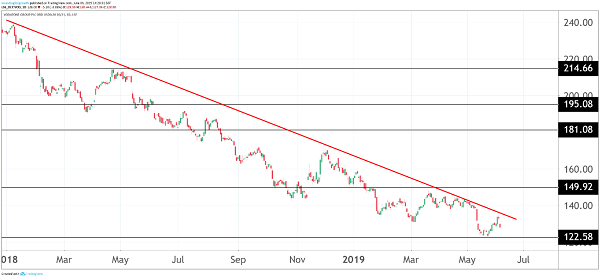Vodafone: Has the share price found a floor?
At extreme levels and with a heap of bad news priced in, this analyst discusses how they can recover.
6th June 2019 14:53
by Graeme Evans from interactive investor
At extreme levels and with a heap of bad news priced in, this analyst discusses how they can recover.

Rebuilding confidence in the battered Vodafone (LSE:VOD) share price won't be quick or easy, particularly with sentiment still largely negative after last month's first ever dividend cut.
What matters most at the moment is whether the blue-chip stock has found a floor after diving to a near ten-year low in the wake of CEO Nick Read's dramatic 40% dividend reduction. Analysts at UBS think they probably have, arguing in a note published today that the negative news surrounding the mobile phone giant now looks to be largely priced in.
They said:
"We think the share price underperformance over the past 12 months has been overdone and that the shares can re-rate as operating momentum gradually improves and overhangs disappear."
While the Vodafone valuation now looks cheap, the broker believes that re-rating may have to wait until there are signs of a stabilisation in service revenues. Vodafone will also need to show it can successfully monetise its portfolio of phone masts and towers, as well as sell other assets on top of existing plans to offload its New Zealand business to private equity.
UBS continues to hold a price target of 207p, which is among the more optimistic in the City. Shares fell 4% today to 128.4p, although this reflected the impact of the stock going ex-dividend.

Source: TradingView Past performance is not a guide to future performance
The broker's research describes investor sentiment overall as remaining bearish, with long-only investors more likely than hedge funds to be pessimistic. "We think the share price is at extreme levels and is assuming that revenue declines continue," they added.
UBS notes there's been limited push-back from investors on the reasons behind the dividend cut, with Vodafone looking to de-leverage at a time when resources are already strained by 5G spectrum auctions and infrastructure demands.
Among its reasons for optimism, UBS points to continued strong growth in mobile data usage and evidence that consumers are still willing to pay more for their services.
This should support the key metric of average revenue per user (ARPU). While European ARPUs are low compared with other markets such as United States, UBS sees improving trends in the UK and Germany as customers pay more for extra services.
This should contribute to a gradual improvement in service revenue trends from the second quarter of this financial year, helped by favourable comparatives against last year.
The broker added:
"While risks remain that promotional activity in Spain could flare up again when Vodafone loses the La Liga rights, the outlook in the UK and Germany looks resilient."
- Income hunters can find great funds on ii’s Super 60 recommended list of investments
- Vodafone dividend cut: which UK shares might be next?
- Why Vodafone dividend cut is a positive
Even after last month's dividend cut, the yield on Vodafone shares has remained punchy at around 6%. The group has also committed to returning to a progressive dividend policy.
The purchase of European assets from Liberty Global in May 2018 fuelled Vodafone's debt worries, leading to leverage approaching three times underlying earnings. The question now for Vodafone investors will be whether Read can maximise the benefits of the Liberty deal, as well as boost returns from infrastructure assets and achieve his business simplification goals.
These articles are provided for information purposes only. Occasionally, an opinion about whether to buy or sell a specific investment may be provided by third parties. The content is not intended to be a personal recommendation to buy or sell any financial instrument or product, or to adopt any investment strategy as it is not provided based on an assessment of your investing knowledge and experience, your financial situation or your investment objectives. The value of your investments, and the income derived from them, may go down as well as up. You may not get back all the money that you invest. The investments referred to in this article may not be suitable for all investors, and if in doubt, an investor should seek advice from a qualified investment adviser.
Full performance can be found on the company or index summary page on the interactive investor website. Simply click on the company's or index name highlighted in the article.